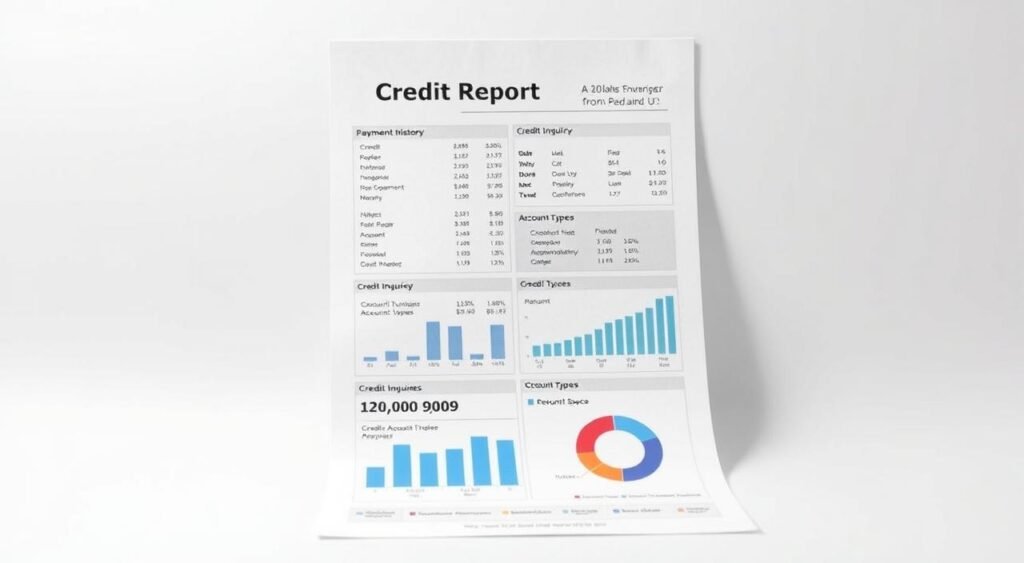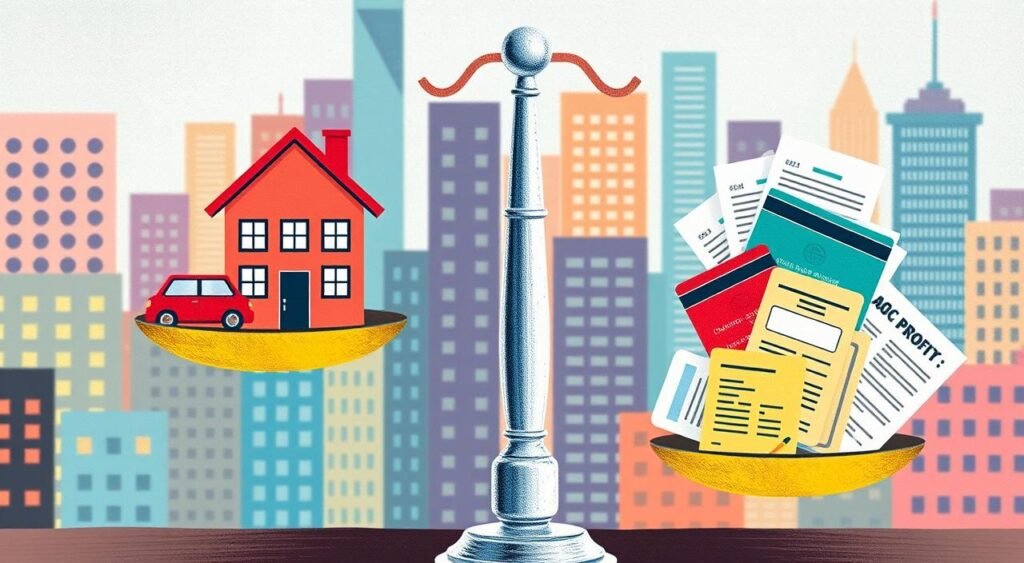How Can Consumer Credit Impact Your Financial Health?
Consumer credit is key to your financial health. Your credit score, from 300 to 850, shows how reliable you are to lenders. A good score means better loan terms and lower interest rates.
For example, a score in the 760-850 range can save you money. On the other hand, scores between 620-639 might cost you more. This can add up to a lot of money over time, like $66,343 on a $200,000 mortgage.
Credit reports from the three major bureaus show your debt history. They include your payment records and how you use your credit. Lenders use this info to decide if they should lend to you and what terms to offer.
Having a good credit report is important. It opens doors to better financial opportunities. It also helps keep your financial security strong.
Key Takeaways
- Consumer credit is a critical factor in determining financial health and opportunities.
- Credit scores range from 300 to 850, with higher scores leading to better loan terms and lower interest rates.
- Credit reports provide a detailed record of an individual’s debt management history, which lenders use to evaluate creditworthiness.
- Maintaining a strong credit profile is crucial for accessing favorable financial products and services.
- Responsible credit management, such as making timely payments and keeping credit utilization low, can positively impact credit scores and overall financial well-being.
Understanding Credit Scores and Their Significance
Your credit score shows how good you are with money. It’s a three-digit number from 300 to 850. Credit bureaus like Equifax, Experian, and TransUnion use a special formula to figure it out.
What Makes Up Your Credit Score
Many things affect your credit score. Payment history counts for 35%, and how much you owe is 30%. Your credit history, mix, and new credit also matter. Paying on time and keeping your credit use low helps a lot.
The FICO Scoring System Explained
The FICO score is key for most lenders. It ranges from 300 to 850. A higher score means you’re less risky for them.
- Poor: 300-579
- Fair: 580-669
- Good: 670-739
- Very Good: 740-799
- Exceptional: 800-850
Credit Score Ranges and Their Meaning
A good credit score, 670 to 850, can get you better loans and rates. But, a bad score (below 579) might cost you more or even deny you credit. Knowing your score’s value helps you manage your finances better.
The Fundamentals of Consumer Credit

Consumer credit includes many options like credit cards, personal loans, mortgages, and auto loans. It’s divided into two main types: revolving credit (like credit cards) and installment credit (like car loans).
Keeping your credit utilization low is key to a good credit score. Experts say to use less than 30% of your available credit. The best scores often use even less.
| Item | Description | Value |
|---|---|---|
| Item price | US $10.62 | Good |
| Shipping | Free shipping, arrives by Christmas | Mishawaka, Indiana, United States |
| Returns policy | 30 days returns, buyer pays for return shipping | Diners Club |
| eBay item number | 276559669371 | – |
Handling different credit types well can boost your credit scores and financial health. Knowing the basics of consumer credit helps you make smart choices and keep your finances strong.
“More than three-quarters of complaints received by the CFPB in 2022 were related to credit reporting, making it the most complained-about industry regulated by the agency.”
Staying within the recommended credit use and mixing your credit types are crucial. Your credit history and good credit management can open doors to better loans, credit cards, and more financial opportunities.
How Credit Reports Shape Your Financial Future

Your credit report is a key tool that affects your financial health. The three major credit bureaus – Equifax, TransUnion, and Experian – create this detailed document. It shows your credit history, including your accounts, payment history, and public records like bankruptcies.
Credit Bureau Reporting Process
The credit bureau reporting process is vital in the credit system. Lenders, insurers, employers, and landlords use your report to decide on credit, insurance, or rentals. It helps them understand your financial responsibility.
Important Elements in Your Credit Report
- Personal information: Your name, address, and Social Security number
- Credit account history: Details on your credit cards, loans, and other credit accounts
- Payment history: A record of your on-time, late, or missed payments
- Credit inquiries: A list of entities that have requested your credit report
- Public records: Information on bankruptcies, foreclosures, or other legal actions
Impact of Payment History on Credit Standing
Your payment history is crucial, making up 35% of your FICO score. On-time payments show you’re responsible and can boost your score. But, late or missed payments can hurt your score, making it harder to get good loans or credit.
| Credit Report Element | Impact on FICO Score |
|---|---|
| Payment History | 35% |
| Amounts Owed | 30% |
| Length of Credit History | 15% |
| Credit Mix | 10% |
| New Credit | 10% |
Knowing your credit report’s parts and their effects on your future can help. You can work to keep a strong credit score. This opens doors to many financial opportunities.
Interest Rates and Credit Score Correlation

Your credit score greatly affects the interest rates you get from lenders. The better your score, the lower the rates on credit cards, personal loans, auto loans, and mortgages. This can really help your finances in the long run.
People with scores from 800 to 850 get the best rates. Those with scores from 300 to 579 face much higher rates. This can mean thousands more in interest over time, especially for big loans like mortgages.
| Credit Score Range | Interest Rate Impact |
|---|---|
| Exceptional (800-850) | Qualify for the lowest interest rates |
| Very Good (740-799) | Eligible for highly competitive interest rates |
| Good (670-739) | Qualify for average market interest rates |
| Fair (580-669) | May face higher than average interest rates |
| Poor (300-579) | Typically subject to the highest interest rates |
Lenders charge more to those with lower scores to lower their risk. Those with great scores are seen as safer, getting better deals and saving a lot on interest.
Knowing how credit scores and interest rates connect is key to good money management. Keeping your credit score high can lead to big savings and financial stability.
The Role of Credit Utilization in Financial Health

Your credit utilization ratio is key to your financial health. It shows how well you manage your credit cards. This ratio, which makes up 30% of your FICO score, is very important.
Optimal Credit Usage Ratios
Lenders like it when you use less than 30% of your available credit. Using less than this shows you’re good with credit. People with top scores use less than 7% of their credit.
Managing Multiple Credit Accounts
With many credit cards, watching your balances is important. Your credit score looks at each card and all of them together. Keeping balances low helps your score.
Strategies for Maintaining Low Balances
- Pay more than the minimum to cut down balances quickly.
- Make payments more than once a month to keep balances low.
- Ask your card issuers to raise your credit limits.
- Combine your card balances into one loan with a lower interest rate.
Keeping your credit card balances low shows lenders you’re responsible. This can help your credit score and financial health.
How Consumer Credit Affects Major Life Decisions

Consumer credit is key in making big life choices. It’s not just about borrowing money. It affects getting a mortgage, finding a rental, and even getting a job. A good credit score can lead to better opportunities.
For mortgage applications, lenders check your credit history. A high score can get you better loan terms and lower interest rates. This helps you buy your dream home. Landlords also look at credit reports to decide if you’re a reliable tenant.
Some employers, especially in finance, check your credit. A clean credit history shows you’re responsible with money. This can help you get hired. Also, insurance companies use credit scores to set your rates. A good score means lower insurance costs.
| Life Decision | Impact of Consumer Credit |
|---|---|
| Mortgage Applications | Lenders evaluate credit history to determine loan approval and interest rates |
| Rental Agreements | Landlords often review credit reports to assess potential tenants |
| Job Applications | Some employers, particularly in financial roles, may review credit reports |
| Insurance Rates | Insurance companies may use credit-based scores to set premium rates |
A strong credit profile opens doors to many opportunities. It helps you find good housing, get a job, and save on insurance. Knowing how credit affects your life is important for making smart financial choices.
“A good credit score is the key that unlocks doors to a brighter financial future.”
Building and Maintaining a Strong Credit Profile

Having a solid credit profile is key to your financial health. It’s important to use credit wisely. This means paying on time, not using too much credit, and having a mix of different credit types.
Avoiding common mistakes is also crucial. Don’t miss payments, don’t use all your credit, and don’t close old accounts. These steps help you keep your credit in good shape for the long run.
Essential Credit Building Strategies
- Make all payments on time. Payment history accounts for 35% of your FICO score.
- Keep credit utilization below 30% of your total available credit. A lower utilization rate is better for your financial literacy.
- Diversify your credit mix by having a combination of revolving credit (credit cards) and installment loans (auto, mortgage, etc.).
- Limit new credit applications, as each “hard inquiry” can temporarily affect your credit score.
- Consider using services like Experian Boost to add utility and phone payments to your credit report.
Common Credit Score Mistakes to Avoid
- Missing payments or making late payments, which can remain on your credit report for up to seven years.
- Maxing out credit cards, leading to high credit utilization ratios.
- Closing old credit accounts, which can negatively impact your credit history length and utilization.
Timeline for Credit Improvement
Improving your credit takes time, but you can see changes in 3-6 months. By consistently using credit responsibly, you can build a strong profile. This will help you make big decisions, like buying a home or a car.
Also Read: Revolving Credit Explained: A Quick Overview
Conclusion
Consumer credit is key to reaching financial goals and keeping financial health. Knowing about credit scores, reports, and what affects creditworthiness helps make smart choices. This leads to better financial terms.
Keeping an eye on credit and managing it well is important. It helps build and keep a strong credit score. Regular checks and education are vital.
The credit world is always changing. It’s important to watch and manage your credit closely. This way, you can fix any mistakes and get better deals.
By understanding credit, you can improve your financial future. Good credit management and staying updated on credit news are crucial. This way, you can confidently manage your finances and look forward to a solid financial future.
FAQs
Q: What is the definition of consumer credit?
A: Consumer credit refers to the amount of credit that financial institutions extend to individuals for personal use, such as purchasing goods and services. This includes various types of loans, such as installment loans and revolving credit accounts.
Q: How does consumer credit impact my financial health?
A: Consumer credit can significantly affect your financial health by influencing your credit score, which is used by banks and financial institutions to determine your creditworthiness. Responsible use of credit can lead to good credit ratings, while mismanagement can lead to debt and potential legal issues.
Q: What are the types of consumer credit available in 2024?
A: In 2024, the common types of consumer credit include installment loans, revolving credit, student loans, motor vehicle loans, and unsecured personal loans. Each type serves different financial needs and comes with its own terms.
Q: What is the difference between installment and revolving credit?
A: Installment credit requires borrowers to repay a fixed amount over a set period, typically in monthly payments. Examples include auto loans and mortgages. Revolving credit, on the other hand, allows consumers to borrow up to a certain limit and pay it off over time, like credit cards.
Q: How can I improve my credit score through consumer credit management?
A: To improve your credit score, focus on making timely monthly payments, keeping credit balances below 30% of your credit limit, and avoiding unnecessary inquiries into your credit report. Additionally, maintaining a good mix of different types of consumer credit can also help.
Q: What is a credit inquiry and how does it affect my financial standing?
A: A credit inquiry occurs when a financial institution checks your credit report to evaluate your creditworthiness. There are two types of inquiries: hard and soft. Hard inquiries can lower your credit score temporarily, while soft inquiries do not impact your score.
Q: What legal protections do I have regarding consumer credit?
A: Consumers are protected under various federal laws, such as the Fair Credit Reporting Act and the Truth in Lending Act, which require financial institutions to provide clear terms and conditions for credit and ensure accurate reporting of credit data.
Q: How can I contact a financial institution for help with credit repair?
A: To contact a financial institution for credit repair assistance, visit their website for customer service options, including phone numbers, email, or live chat. Many banks and credit unions also offer dedicated services for credit counseling and financial advice.
Q: What should I consider before applying for a consumer loan?
A: Before applying for a consumer loan, consider the annual percentage rate (APR), loan terms, fees, and your ability to make monthly payments. It’s also important to assess your current debt levels and ensure that the additional loan won’t strain your financial situation.
Source Links
- https://www.finra.org/investors/personal-finance/how-your-credit-score-impacts-your-financial-future
- https://nul.org/blog/your-credit-why-credit-reports-and-scores-matter-your-financial-health
- https://www.investopedia.com/terms/c/credit_score.asp
- https://financialaid.berkeley.edu/center-for-financial-wellness/financial-literacy-hub/understanding-credit/
- https://www.experian.com/blogs/ask-experian/credit-education/score-basics/understanding-credit-scores/
- https://www.ebay.com/itm/276559669371
- https://sgp.fas.org/crs/misc/R44125.pdf
- https://crosscheckcompliance.com/resources/articles/fcra-fundamentals-permissible-purpose-and-use-of-consumer-reports/
- https://www.federalreserve.gov/creditreports/pdf/credit_reports_scores_2.pdf
- https://www.equifax.com/business/blog/-/insight/article/major-benefits-of-credit-reporting-for-both-consumers-and-lenders/
- https://www.experian.com/blogs/ask-experian/why-do-people-with-higher-credit-scores-get-lower-interest-rates/
- https://www.experian.com/blogs/ask-experian/fed-rate-cuts-will-take-time-to-impact-consumers/
- https://www.equifax.com/personal/education/debt-management/articles/-/learn/credit-utilization-ratio/
- https://www.bankrate.com/credit-cards/advice/credit-utilization-ratio/
- https://www.cbsnews.com/news/how-credit-utilization-affects-your-credit-score-and-what-to-do-about-it/
- https://www.ftc.gov/sites/default/files/attachments/training-materials/law_practice.pdf
- https://www.consumerfinance.gov/data-research/research-reports/the-impact-of-differences-between-consumer-and-creditor-purchased-credit-scores/
- https://www.wolterskluwer.com/en/expert-insights/understanding-the-types-and-sources-of-consumer-credit
- https://www.investopedia.com/how-to-improve-your-credit-score-4590097
- https://www.experian.com/blogs/ask-experian/credit-education/improving-credit/building-credit/
- https://www.nerdwallet.com/article/finance/how-to-build-credit
- https://www.ecb.europa.eu/press/blog/date/2024/html/ecb.blog20240515~d1ec234603.en.html
- https://files.consumerfinance.gov/f/documents/cfpb_disputes-on-consumer-credit-reports_report_2021-11.pdf
- https://www.elgaronline.com/monochap/9781784712488.00013.xml
